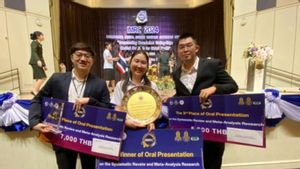JAKARTA - The Elected Chair of the Indonesian Cardiovascular Specialist Doctors Association (PERKI) Dr. Radityo Prakoso, SpJP(K), FIHA, said parents need to know the risk factors for Congenital Heart Disease (CHD) through premarital screening.
"Premarital screening and genetic counseling can identify and modify, through prevention and management, some of the behavioral, medical, and other risk factors that can affect pregnancy outcomes," said Dr. Radityo in the Heartology Cardiovascular Center online seminar, quoted by Antara, Sunday.
"It also involves promoting the health of women and their partners prior to the occurrence of a pregnancy, which is primary prevention and an important step in building a healthy society."
For information, Congenital Heart Disease (CHD) is a heart disease that has been present since birth due to imperfect heart formation in the early stages of fetal development in the womb.
CHD causes disruption of blood flow in the heart chambers so that the blood pump is not sufficient for the body's needs, so that without good pregnancy control, CHD is often not diagnosed before the baby is born. By the time parents find out that they have a baby, the heart development process is complete.
In Indonesia alone, according to data from PERKI, there are 9 out of 1,000 babies born with CHD.
There are also a number of risk factors that can be identified through the screening. The first is the CHD gene that runs in families and is associated with many genetic syndromes. Then Rubella which can affect fetal heart development, and diabetes which increases the risk of CHD. Please note, gestational diabetes does not increase the risk of CHD.
Furthermore, the use of drugs such as lithium or isoretinoin was associated with CHD, followed by alcohol consumption and smoking.
Now, some CHD can be visualized by fetal echocardiography in the second trimester.
"Fetal cardiologists have an important role not only to make a diagnosis, but also to provide prenatal counseling to help patients," said Dr. Radityo.
Prenatal diagnosis provides an opportunity for parents to consult about their child's diagnosis and increase parents' understanding of CHD. It also gives parents time to decide whether to continue or terminate a pregnancy, and to process emotions.
Next, there is newborn screening for critical CHD, performed by pulse oximetry. This test estimates the amount of oxygen in the baby's blood. Screening is done when the baby is at least 24 hours old or as late as possible before the baby is discharged if measured before 24 hours.
Dr. Radityo said that currently PJB can be treated without surgery. Zero Fluoroscopy (without radiation) catheter intervention is a cutting-edge technique for treating CHD without radiation and surgery.
It is known, radiation can cause long-term effects for both patients and doctors, and the catheterization laboratory team.
The English, Chinese, Japanese, Arabic, and French versions are automatically generated by the AI. So there may still be inaccuracies in translating, please always see Indonesian as our main language. (system supported by DigitalSiber.id)












